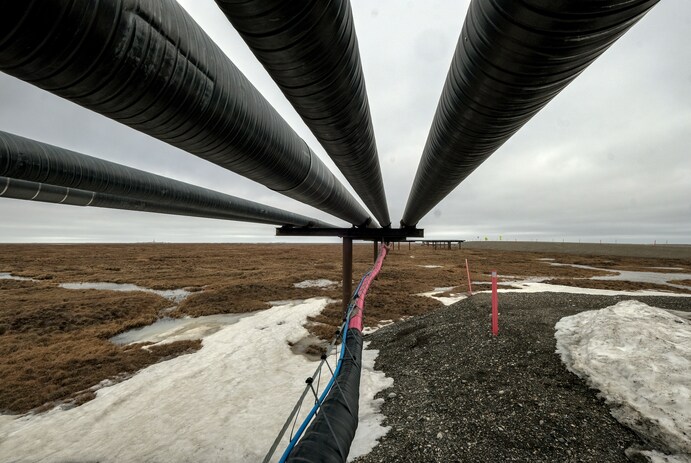Despite objections that the project would jeopardize American efforts to sabotage the global phase-out of fossil fuels, the Biden administration on Monday authorized one of the biggest oil projects on federal property, delivering a victory to Alaskan business and its legislative supporters.
The multibillion-dollar Willow drilling project by energy behemoth ConocoPhillips on Alaska’s North Slope was opposed by those who anticipated that President Biden would veto it. According to a federal Record of Decision published on Monday, the administration decided to allow the oil company to construct three pads in the National Petroleum Reserve-Alaska (NPR-A), the largest expanse of public land in the country, despite the possibility that such a decision would be overturned in court.
The choice reduces the project from the five pads that ConocoPhillips had initially suggested, but it still permits development on what company representatives have characterized as a location that is big enough for them. The business said in a statement on Monday that it would instantly begin building at least one gravel road before making a definitive investment choice on the entire project.
White House officials have struggled with the difficult project, which has resulted in weeks of painful talks with supporters on both sides of the argument. The conclusion of years of discussion regarding the future of drilling in the North is Willow. Fighting it has become a top concern for environmentalists, and in recent weeks, youth activists started the #StopWillow TikTok campaign to increase pressure.
Biden had promised to outlaw “new oil and gas permitting on public lands and waters” during the 2020 campaign, and environmentalists claimed that the project would undermine his admirable climate promises.
The Interior Department acknowledged ConocoPhillips’ possession of the region’s license rights, which the company has held since the late 1990s, in a statement released on Monday, though it did not completely explain why it had approved the project. The agency emphasized its choice, made late Sunday, to seek additional conservation measures for the area and to reject approvals for two of the five planned drilling locations.
The Teshekpuk Lake caribou herd is a significant subsistence resource for nearby Alaska Native communities, and the department said the actions would create an additional buffer from exploration and development activities close to the herd’s calving grounds and migration routes. “Within the boundaries of legitimate existing rights under decades-old leases granted by previous Administrations,” the Willow Project has been considerably scaled back.
16 million acres of land and ocean in Alaska are covered by the additional steps unveiled on Sunday. Included in this are new Interior rules to safeguard nearly 13 million acres in the NPR-A, including environmentally delicate regions that serve as refuge for thousands of caribou and shorebirds, as well as the prohibition of U.S. oil and gas licensing in the Arctic Ocean. Interior announced Monday that ConocoPhillips will also give up the oil rights to about 68,000 acres of leases it presently owns in NPR-A, with about 60,000 of those acres being in the Teshekpuk Lake Special Area.
ConocoPhillips CEO Ryan Lance said in a statement that this was the best course of action for Alaska and the country. Willow “fits within the Biden Administration’s objectives on environmental and social justice, supporting the energy shift and improving our energy security, all while generating decent union employment and benefiting Alaska Native communities.”
A gravel mine, a sizable processing center, airstrips, and hundreds of miles of roadways and pipes will also be allowed to be built on the reserve’s nearly pristine tundra and wetlands. The area was initially designated for oil production 100 years ago, but today only two locations, both operated by ConocoPhillips, generate oil there. Despite this, the area still serves as an essential habitat for caribou, waterfowl, and other animals that are migrating.
According to energy consulting company Wood Mackenzie, few drilling operations are as large as Willow, which ConocoPhillips predicts will continue to run for the next 30 years. Alpine West and Greater Mooses Tooth, the company’s other two oil-producing ventures on the area, have lesser reserves. When it authorized BP’s Mad Dog Phase 2 in the Gulf of Mexico nearly eight years ago, it was the last time the federal government gave its blessing to such a sizable undertaking.
In order to achieve its climate goals and prevent catastrophic warming, the world must completely eliminate its greenhouse gas emissions by the middle of the century, according to the U.N. Intergovernmental Panel on Climate Change, which is made up of hundreds of the world’s top climate and energy experts.

